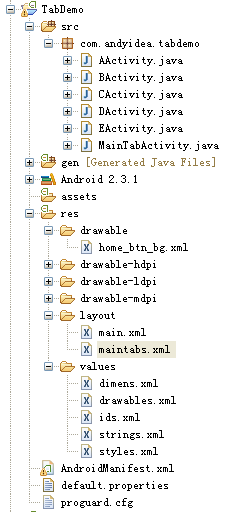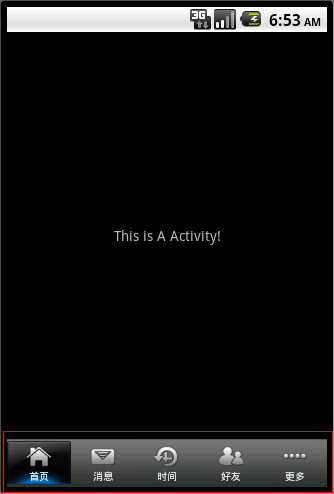现在很多android的应用都采用底部导航栏的功能,这样可以使得用户在使用过程中随意切换不同的页面,现在我采用TabHost组件来自定义一个底部的导航栏的功能。
我们先看下该demo实例的框架图:

其中各个类的作用以及资源文件就不详细解释了,还有资源图片(在该Demo中借用了其它应用程序的资源图片)也不提供了,大家可以自行更换自己需要的资源图片。直接上各个布局文件或各个类的代码:
1、 res/layout目录下的 maintabs.xml 源码:
<"1.0" encoding="UTF-8"?> <TabHost android:id="@android:id/tabhost" android:layout_width="fill_parent" android:layout_height="fill_parent" xmlns:android="http://schemas.android.com/apk/res/android"> <LinearLayout android:orientation="vertical" android:layout_width="fill_parent" android:layout_height="fill_parent"> <FrameLayout android:id="@android:id/tabcontent" android:layout_width="fill_parent" android:layout_height="0.0dip" android:layout_weight="1.0" /> <TabWidget android:id="@android:id/tabs" android:visibility="gone" android:layout_width="fill_parent" android:layout_height="wrap_content" android:layout_weight="0.0" /> <RadioGroup android:gravity="center_vertical" android:layout_gravity="bottom" android:orientation="horizontal" android:id="@id/main_radio" android:background="@drawable/maintab_toolbar_bg" android:layout_width="fill_parent" android:layout_height="wrap_content"> <RadioButton android:id="@id/radio_button0" android:layout_marginTop="2.0dip" android:text="@string/main_home" android:drawableTop="@drawable/icon_1_n" /> <RadioButton android:id="@id/radio_button1" android:layout_marginTop="2.0dip" android:text="@string/main_news" android:drawableTop="@drawable/icon_2_n" /> <RadioButton android:id="@id/radio_button2" android:layout_marginTop="2.0dip" android:text="@string/main_manage_date" android:drawableTop="@drawable/icon_3_n" /> <RadioButton android:id="@id/radio_button3" android:layout_marginTop="2.0dip" android:text="@string/main_friends" android:drawableTop="@drawable/icon_4_n" /> <RadioButton android:id="@id/radio_button4" android:layout_marginTop="2.0dip" android:text="@string/more" android:drawableTop="@drawable/icon_5_n" /> </RadioGroup> </LinearLayout> </TabHost>
2、res/drawable 下的 home_btn_bg.xml 源码:
<selector xmlns:android="http://schemas.android.com/apk/res/android"> <item android:state_focused="true" android:state_enabled="true" android:state_pressed="false" android:drawable="@drawable/home_btn_bg_s" /> <item android:state_enabled="true" android:state_pressed="true" android:drawable="@drawable/home_btn_bg_s" /> <item android:state_enabled="true" android:state_checked="true" android:drawable="@drawable/home_btn_bg_d" /> <item android:drawable="@drawable/transparent" /> </selector>
3、res/values 下的源码:
dimens.xml源码:
<"1.0" encoding="utf-8"?> <resources> <dimen name="bottom_tab_font_size">10.0sp</dimen> <dimen name="bottom_tab_padding_up">5.0dip</dimen> <dimen name="bottom_tab_padding_drawable">2.0dip</dimen> <dimen name="switch_logo_bottom_padding">30.0sp</dimen> <dimen name="widget_height">100.0dip</dimen> <dimen name="sta_height">48.0dip</dimen> <dimen name="large_padding_length">20.0dip</dimen> <dimen name="widget_write_margin_top">19.0dip</dimen> <dimen name="widget_write_margin_left">10.0dip</dimen> <dimen name="widget_content_margin_top">20.0dip</dimen> <dimen name="widget_content_margin_left">10.0dip</dimen> <dimen name="widget_logo_size">35.0dip</dimen> <dimen name="title_height">74.0dip</dimen> <dimen name="new_blog_size">70.0dip</dimen> <dimen name="emotion_item_view_height">13.299988dip</dimen> <dimen name="splash_test_top_margin_top">20.0dip</dimen> <dimen name="splash_test_center_margin_right">0.0dip</dimen> <dimen name="title_text_size">20.0sp</dimen> <dimen name="normal_padding_length">10.0dip</dimen> <dimen name="no_result_padding_length">50.0dip</dimen> </resources>
drawables.xml源码:
<"1.0" encoding="utf-8"?> <resources> <item type="drawable" name="ltgray">#fff4f4f4</item> <item type="drawable" name="ltyellow">#fffff4db</item> <item type="drawable" name="black">#ff000000</item> <item type="drawable" name="transparent">#00000000</item> <item type="drawable" name="widget_edit_block_bg_normal">@android:color/transparent</item> <item type="drawable" name="transparent_background">#99000000</item> <item type="drawable" name="list_background">#fff4f4f4</item> <item type="drawable" name="namcard_picker_bkg_normal">#ff272727</item> <item type="drawable" name="namcard_picker_bkg_hover">#ff333333</item> </resources>
ids.xml源码:
<"1.0" encoding="utf-8"?> <resources> <item type="id" name="main_radio">false</item> <item type="id" name="radio_button0">false</item> <item type="id" name="radio_button1">false</item> <item type="id" name="radio_button2">false</item> <item type="id" name="radio_button3">false</item> <item type="id" name="radio_button4">false</item> </resources>
strings.xml源码:
<"1.0" encoding="utf-8"?> <resources> <string name="hello">Hello World, MainTabActivity!</string> <string name="app_name">TabDemo</string> <string name="main_news">消息</string> <string name="main_home">首页</string> <string name="more">更多</string> <string name="main_manage_date">时间</string> <string name="main_friends">好友</string> </resources>
styles.xml源码:
<"1.0" encoding="utf-8"?> <resources> <style name="main_tab_bottom"> <item name="android:textSize">@dimen/bottom_tab_font_size</item> <item name="android:textColor">#ffffffff</item> <item name="android:ellipsize">marquee</item> <item name="android:gravity">center_horizontal</item> <item name="android:background">@drawable/home_btn_bg</item> <item name="android:paddingTop">@dimen/bottom_tab_padding_up</item> <item name="android:paddingBottom">2.0dip</item> <item name="android:layout_width">fill_parent</item> <item name="android:layout_height">wrap_content</item> <item name="android:layout_marginBottom">2.0dip</item> <item name="android:button">@null</item> <item name="android:singleLine">true</item> <item name="android:drawablePadding">@dimen/bottom_tab_padding_drawable</item> <item name="android:layout_weight">1.0</item> </style> </resources>
4、 src/com.andyidea.tabdemo包下面各个UI界面类源码:
MainTabActivity.java源码:
package com.andyidea.tabdemo; import android.app.TabActivity; import android.content.Intent; import android.os.Bundle; import android.view.Window; import android.widget.CompoundButton; import android.widget.RadioButton; import android.widget.CompoundButton.OnCheckedChangeListener; import android.widget.TabHost; public class MainTabActivity extends TabActivity implements OnCheckedChangeListener{ private TabHost mTabHost; private Intent mAIntent; private Intent mBIntent; private Intent mCIntent; private Intent mDIntent; private Intent mEIntent; /** Called when the activity is first created. */ @Override public void onCreate(Bundle savedInstanceState) { super.onCreate(savedInstanceState); requestWindowFeature(Window.FEATURE_NO_TITLE); setContentView(R.layout.maintabs); this.mAIntent = new Intent(this,AActivity.class); this.mBIntent = new Intent(this,BActivity.class); this.mCIntent = new Intent(this,CActivity.class); this.mDIntent = new Intent(this,DActivity.class); this.mEIntent = new Intent(this,EActivity.class); ((RadioButton) findViewById(R.id.radio_button0)) .setOnCheckedChangeListener(this); ((RadioButton) findViewById(R.id.radio_button1)) .setOnCheckedChangeListener(this); ((RadioButton) findViewById(R.id.radio_button2)) .setOnCheckedChangeListener(this); ((RadioButton) findViewById(R.id.radio_button3)) .setOnCheckedChangeListener(this); ((RadioButton) findViewById(R.id.radio_button4)) .setOnCheckedChangeListener(this); setupIntent(); } @Override public void onCheckedChanged(CompoundButton buttonView, boolean isChecked) { if(isChecked){ switch (buttonView.getId()) { case R.id.radio_button0: this.mTabHost.setCurrentTabByTag("A_TAB"); break; case R.id.radio_button1: this.mTabHost.setCurrentTabByTag("B_TAB"); break; case R.id.radio_button2: this.mTabHost.setCurrentTabByTag("C_TAB"); break; case R.id.radio_button3: this.mTabHost.setCurrentTabByTag("D_TAB"); break; case R.id.radio_button4: this.mTabHost.setCurrentTabByTag("MORE_TAB"); break; } } } private void setupIntent() { this.mTabHost = getTabHost(); TabHost localTabHost = this.mTabHost; localTabHost.addTab(buildTabSpec("A_TAB", R.string.main_home, R.drawable.icon_1_n, this.mAIntent)); localTabHost.addTab(buildTabSpec("B_TAB", R.string.main_news, R.drawable.icon_2_n, this.mBIntent)); localTabHost.addTab(buildTabSpec("C_TAB", R.string.main_manage_date, R.drawable.icon_3_n, this.mCIntent)); localTabHost.addTab(buildTabSpec("D_TAB", R.string.main_friends, R.drawable.icon_4_n, this.mDIntent)); localTabHost.addTab(buildTabSpec("MORE_TAB", R.string.more, R.drawable.icon_5_n, this.mEIntent)); } private TabHost.TabSpec buildTabSpec(String tag, int resLabel, int resIcon, final Intent content) { return this.mTabHost.newTabSpec(tag).setIndicator(getString(resLabel), getResources().getDrawable(resIcon)).setContent(content); } }
其中 AActivity.java 与 BActivity.java ,CActivity.java ,DActivity.java ,EActivity.java 中的源码都一样,只是用来表示不同的界面展示,故这里只列出 AActivity.java的源码:
package com.andyidea.tabdemo; import android.app.Activity; import android.os.Bundle; import android.view.Gravity; import android.widget.TextView; public class AActivity extends Activity{ @Override public void onCreate(Bundle savedInstanceState) { super.onCreate(savedInstanceState); TextView tv = new TextView(this); tv.setText("This is A Activity!"); tv.setGravity(Gravity.CENTER); setContentView(tv); } }
最后,大家别忘了在 AndroidManifest.xml 文件中注册各个 Activity 组件哦。好了,现在我们看下我们程序运行的效果图:

源码下载: Android实现底部导航栏功能(选项卡)
到此就实现了一个比较流行的底部导航栏的功能了,希望本文所述对大家学习Android软件编程有所帮助。


